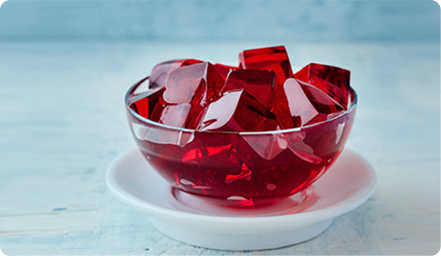-
July, 26,2025
Understanding the Role of Bloom Strength in Soft Gelatin Capsules
-
July, 25,2025
Bloom Strength and Its Impact on Hard Gelatin Capsules
-
July, 21,2025
How Gelatin Is Revolutionizing Pet Food: A Healthier Option for Dogs
-
June, 22,2025
Collagen as a Trusted Ingredient: Meeting Global Demand with Reliable Supply
Halal Edible Gelatin – What It Is and Why It Matters in Food, Pharma, and Beyond
What Is Halal Gelatin?
The Meaning of Halal in Food Context
“Halal” is an Arabic word that means “permissible” according to Islamic law. When applied to food, it refers to ingredients and production processes that meet strict religious guidelines observed by Muslim consumers. For a product to be truly halal, every aspect—from ingredient sourcing to slaughtering, processing, and packaging—must comply with Islamic dietary principles.
This includes animal-derived ingredients like gelatin, which must come from halal-certified sources and be processed under verified halal conditions.
What Makes Gelatin Halal or Not?
Gelatin is a common gelling agent used in foods, pharmaceuticals, and supplements. It is typically derived from animal collagen, most commonly from bovine or porcine sources. The halal status of gelatin hinges on two key factors:
- The Source Animal: For gelatin to be halal, it must be made from animals that are permissible to eat (such as cows or fish), and those animals must be slaughtered by Islamic law. Gelatin from pigs is strictly forbidden (haram).
- Processing and Certification: Even if the source is halal, the production facility must be free from cross-contamination with haram materials and must follow a halal-certified process.
A certified halal gelatin not only satisfies religious dietary laws but also represents a trusted choice for manufacturers seeking to serve the growing global Muslim market.
Main Sources of Halal Edible Gelatin
Bovine Gelatin from Halal-Slaughtered Cattle
Among halal gelatin options, bovine gelatin is one of the most widely accepted sources. When derived from cattle that are slaughtered according to Islamic principles, bovine gelatin becomes a versatile and compliant choice for halal-certified food and pharmaceutical products. Its strong gel strength and wide functional range make it ideal for applications like gummy candies, dairy desserts, and soft capsules.
As a trusted gelatin manufacturer, FNP Gelatin offers edible-grade bovine gelatin that meets halal standards. Every batch can be traced back to verified halal-certified sources, ensuring both religious compliance and consistent quality.
Fish Gelatin as a Universally Permissible Option
Fish gelatin is also recognized as halal by all major Islamic authorities, since fish is inherently halal and does not require ritual slaughter. Fish-derived gelatin is especially valuable in regions with strict interpretations of halal laws or where cross-species contamination must be avoided entirely.
Though fish gelatin is typically more expensive and has different gelling properties, it remains a useful alternative in products such as halal supplements, beverages, and cosmetics.
Plant-Based Gelling Alternatives – Are They Halal by Default?
Gelling agents like agar, carrageenan, and pectin are often used in vegetarian and vegan products. These are generally considered halal, as they are plant-derived. However, they are not technically classified as “gelatin,” and their functional behavior differs, especially in terms of bloom strength, melt-in-mouth texture, and film-forming ability.
Therefore, for formulations that specifically require gelatin (e.g., chewy textures or gelatin capsules), a halal-certified animal source remains essential.
As an edible gelatin supplier with deep expertise, FNP Gelatin can help manufacturers compare sources and select the most appropriate type of halal gelatin for their formulation needs.
Why Halal Gelatin Matters
Meeting the Needs of Muslim Consumers
Globally, over 1.9 billion Muslims represent a significant and rapidly growing consumer base. Many of them actively seek halal-certified products that align with their religious beliefs—not just in food, but also in pharmaceuticals, cosmetics, and dietary supplements.
Using halal gelatin ensures compliance with Islamic dietary laws and helps brands tap into the expanding halal economy. For any edible gelatin manufacturer, providing halal-certified options isn’t just a regulatory requirement—it’s a strategic market advantage.
Ethical and Health-Driven Ingredient Choices
Halal-certified products are often perceived as cleaner, safer, and more ethical—attributes that resonate not just with Muslim consumers but with health-conscious buyers across all markets. Halal gelatin production requires strict traceability, sanitation, and purity, offering reassurance in today’s transparency-driven landscape.
This makes halal gelatin particularly attractive to companies in the nutraceutical, food, and pharmaceutical sectors seeking to enhance their brand credibility and meet global compliance standards.
As a dedicated gelatin supplier, FNP Gelatin supports clients with transparent documentation, halal certification, and guaranteed edible gelatin purity. FNP’s focus on only edible-grade products—excluding any industrial gelatin—ensures safety and compliance across diverse market sectors.
Common Applications of Halal Edible Gelatin
Confectionery, Bakery, and Dairy Products
Halal gelatin is widely used as a gelling, stabilizing, and texturizing agent in various food products. In halal-certified confectionery, it plays a vital role in producing gummies, marshmallows, and jelly candies with the desired chewiness and clarity. In bakery and dairy sectors, it contributes to the smooth texture and structural stability of mousses, panna cotta, yogurt, and whipped toppings.
For food producers targeting halal markets, sourcing from a certified edible gelatin manufacturer like FNP Gelatin ensures compliance without compromising product performance. FNP offers consistent, high-quality halal bovine gelatin suitable for a broad range of food applications.
Halal Pharmaceuticals and Nutraceuticals
In the pharmaceutical industry, gelatin is a key ingredient in the production of softgel capsules, tablets, and coatings. These delivery forms rely on gelatin's solubility and biocompatibility, especially in over-the-counter medications and dietary supplements.
Muslim consumers increasingly demand that these products also meet halal standards. A gelatin supplier offering verifiable halal certifications, like FNP Gelatin, enables pharmaceutical companies to expand into Muslim-majority regions and meet global compliance requirements.
Cosmetics and Personal Care Applications
Gelatin’s film-forming and moisture-retention properties make it useful in the formulation of beauty masks, peel-off skincare treatments, and hair care products. For cosmetics marketed as halal, the source and processing of every ingredient, including gelatin, must be halal-certified.
FNP Gelatin serves as a reliable gelatin manufacturer for personal care brands that need halal-grade, non-industrial gelatin, helping them maintain religious compliance while ensuring product performance.
Halal Certification: Ensuring Compliance
Top Global Halal Certification Bodies
For gelatin to be accepted as halal, it must be certified by a recognized halal authority. These organizations audit production facilities, review ingredient sourcing, and ensure compliance with Islamic dietary regulations. Some of the most respected halal certification bodies include:
- JAKIM (Malaysia) – Highly regarded in Southeast Asia and the Middle East.
- MUI (Indonesia) – One of the largest certifiers in the global halal food and pharma sector.
- IFANCA (USA) – A leading halal certifier for North American and global markets.
- HCA (Europe) – Covers halal certification needs in the EU and beyond.
Working with a gelatin manufacturer that maintains recognized certifications from these bodies is essential for exporters targeting halal markets. FNP Gelatin, for example, complies with international halal certification standards, providing customers peace of mind across regions.
Labeling and Documentation Requirements
Halal-compliant products must be properly labeled to communicate their certification status to consumers and regulators. This includes:
- The official halal certification logo
- Batch-specific halal compliance documentation
- Clear identification of the animal source used (e.g., bovine gelatin)
- Absence of cross-contamination in the production process
As a professional edible gelatin supplier, FNP Gelatin offers complete halal documentation, making it easier for food, pharma, and personal care brands to meet local regulatory demands and win consumer trust.
Whether for product labeling, customs clearance, or retail packaging, having a reliable supplier with the right credentials is key to halal market success.
How to Choose a Trusted Halal Gelatin Manufacturer
What to Look for in a Halal Gelatin Supplier
Choosing a reliable halal gelatin supplier is critical for manufacturers in the food, pharmaceutical, and personal care industries. Here are the key factors to consider:
- Certified Halal Compliance: The manufacturer should hold valid halal certifications from globally recognized authorities (such as JAKIM, MUI, or IFANCA).
- Animal Traceability: Full transparency on the origin of the animal source (bovine or fish) is essential, including slaughter and processing records.
- Dedicated Production Lines: To avoid contamination with non-halal materials, separate production lines or verified clean-down procedures must be in place.
- Consistent Quality Control: Look for suppliers with strict QC protocols and international food-grade certifications (ISO, HACCP, etc.).
- Responsive Technical Support: The supplier should provide halal compliance documentation, formulation guidance, and support for regulatory inquiries.
A trustworthy edible gelatin manufacturer should not only offer halal options but also help clients streamline audits, labeling, and export documentation.
FNP Gelatin – A Compliant and Certified Halal Supplier
FNP Gelatin is an established gelatin manufacturer and gelatin supplier that offers both bovine and pork-derived edible gelatin to meet different market needs, while separating production lines to prevent cross-contamination. For halal-specific applications, FNP provides halal-certified bovine gelatin that is rigorously tested and compliant with global certification standards.
Importantly, FNP focuses solely on edible gelatin, supplying no technical or industrial-grade products. This specialization makes FNP a dependable partner for clients seeking safe, clean-label, and halal-compliant ingredients.
Whether you're producing halal gummies, softgel capsules, or clean-label dairy desserts, FNP delivers the quality and compliance your business requires.
Final Thoughts: The Rising Importance of Halal Gelatin in Modern Manufacturing
As global demand for halal-certified products grows, gelatin sourcing has become a strategic consideration for food, pharma, and personal care brands alike. Halal gelatin is no longer a niche ingredient—it’s a cornerstone of ethical production and inclusive market access.
For businesses seeking to build trust with Muslim consumers and comply with international halal standards, choosing a reputable gelatin manufacturer is crucial. FNP Gelatin, as a dedicated edible gelatin supplier, offers certified halal bovine gelatin with global documentation, traceability, and performance reliability.
By aligning with a proven partner like FNP Gelatin, brands can ensure quality, compliance, and long-term credibility in the halal marketplace.
FAQs
Q1: Is all bovine gelatin halal?
No. While bovine gelatin comes from an animal generally considered halal, it must be sourced from cattle that are slaughtered according to Islamic law. Only then, and with proper certification, can it be considered halal.
Q2: Is halal gelatin the same as kosher gelatin?
Not exactly. Although both follow strict religious guidelines, halal and kosher have different requirements and are certified by different authorities. A product can sometimes be both, but verification is needed for each.
Q3: Can I tell if gelatin is halal by reading the ingredient list?
Not always. Ingredient lists usually state "gelatin" without specifying the source or certification. To ensure a product is halal, look for a recognized halal certification logo on the packaging or consult the manufacturer.
Q4: Are vegan alternatives like agar or pectin halal?
Yes. Most plant-based gelling agents, such as agar, carrageenan, and pectin, are naturally halal. However, they differ in texture and functionality compared to animal-derived gelatin.
Q5: Does FNP Gelatin supply halal gelatin only?
FNP Gelatin supplies both halal-certified bovine edible gelatin and non-halal pork-derived edible gelatin for markets that allow it.
Phone: +86-577-88105990
Mobile: +86-138 5886 1938
Official Website: www.fnp-gelatin.com
Email: sales@funingpu.com
Address: No. 1-10 Wenpu Road, Yacheng Town, Xiapu County, Ningde City, Fujian Province




